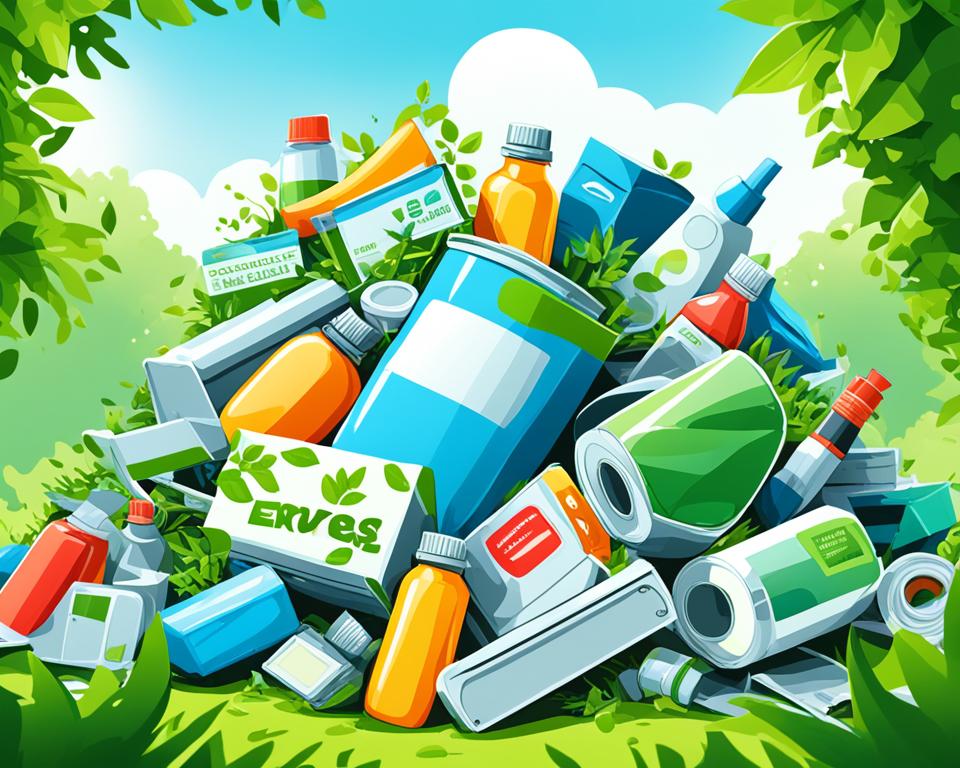The fashion industry’s “take-make-dispose” model has had a detrimental environmental impact, contributing to increased production and waste. However, there are investment opportunities in brands that prioritize sustainability and embrace circular economy practices. One such area of growth is the trainer resale market, which is projected to reach a value of $6 billion by 2025. Investing in companies that prioritize upcycled materials and extended product life cycles can support sustainability efforts and potentially yield profits in the circular economy.
Key Takeaways:
- Investing in upcycled materials stocks allows for both environmental impact and financial returns.
- The trainer resale market is a growing sector within the fashion industry, providing investment opportunities.
- Companies embracing sustainability and circular economy practices are leading the way in the industry.
- Upcycled materials and extended product life cycles support sustainability efforts.
- The fashion industry’s shift towards circular economy practices presents promising investment potential.
Table of Contents
The Importance of Resale in Sustainable Apparel
The resale market plays a crucial role in extending the life of apparel products and reducing waste. By giving pre-owned items a second chance, the resale market contributes to the principles of circular economy investing and environmental sustainability.
Platforms such as GOAT.com provide a convenient space for selling and buying authenticated, cleaned, and second-hand shoes. This thriving market is primarily fueled by the demand from millennials and Generation Z, who prioritize sustainability and value pre-owned products.
Recognizing the significance of the resale market, renowned companies like Nike and Adidas have taken steps to support this sustainable approach. They have shifted their focus towards creating higher quality designs and production techniques, encouraging customers and businesses alike to view products as more than just disposable items.
Investing in upcycled products and companies that emphasize the resale of apparel aids in reducing waste and promotes a more sustainable fashion industry. It aligns with environmental investments and circular economy principles, contributing to a greener future.
The Rise of Resale Platforms
- GOAT.com provides a trusted marketplace for buying and selling second-hand shoes.
- Authenticating and cleaning pre-owned footwear ensures quality and customer satisfaction.
- Youthful generations, such as millennials and Gen Z, are driving the demand for sustainable and pre-owned products.
Major Brands Embracing the Resale Market
- Nike and Adidas have acknowledged the importance of the resale market and are investing in higher quality design and production techniques.
- By promoting the resale of apparel, these brands encourage a shift in consumer behavior towards viewing products as valuable and extending their life cycles.
Innovative Approaches to Sustainable Fashion
Many companies in the fashion industry are implementing changes to make their products more sustainable. Adidas and Nike are leading the way with their innovative approaches to eco-friendly fashion.
Adidas: Commitment to Recycled Polyester
Adidas has made a significant commitment to sustainability by pledging to use only recycled polyester in every product by 2024. This commitment demonstrates their dedication to reducing environmental impact and promoting a circular economy. By utilizing recycled materials, Adidas not only reduces the demand for virgin polyester but also reduces waste and carbon emissions associated with production processes. This forward-thinking approach provides an investment opportunity for those interested in green investing and supporting eco-friendly brands.
Nike: Embracing Upcycled Materials
Nike has been at the forefront of sustainable fashion, incorporating upcycled materials into their core product lines. One standout example is Nike’s Flyknit shoes, which utilize 100% recycled polyester yarn. By repurposing materials that would otherwise end up in landfills, Nike reduces waste and conserves resources. In addition, Nike Grind, a longstanding program by the company, repurposes surplus materials and footwear to create new products, further contributing to a circular business model. Nike’s commitment to eco-friendly innovation presents an opportunity for eco-friendly investments and supports sustainable practices within the fashion industry.
| Brand | Initiative | Impact |
|---|---|---|
| Adidas | Commitment to using only recycled polyester | Reduces waste, carbon emissions, and reliance on virgin materials |
| Nike | Incorporation of upcycled materials in core products | Reduces waste, conserves resources, and promotes circular economy |
The Need for Textile Recycling Infrastructure
While recycling is an important aspect of sustainability, there are still barriers to efficient textile recycling. One of the main challenges is the mixed fiber content of many textiles, which makes it difficult to separate and process different materials effectively. Another challenge is the limited access to recycling services, particularly in certain regions or communities.
To truly address the issue of textile waste and promote a circular economy in the apparel industry, brands must go beyond traditional recycling methods. They should explore additional initiatives such as:
- Creating reuse/resale channels to extend the lifespan of clothing
- Implementing takeback programs to encourage customers to return used garments
- Participating in extended producer responsibility schemes to take ownership of the end-of-life phase of their products
These initiatives require collaboration and consortiums between brands, governments, and recycling organizations to build a robust textile recovery infrastructure. By investing in companies that focus on developing innovative textile recycling technologies and creating a comprehensive recovery value chain, investors can actively support sustainability efforts in the fashion industry.
Benefits of Textile Recycling Infrastructure
An efficient textile recycling infrastructure offers several benefits:
- Reduction of environmental impact: Recycling textiles helps reduce the consumption of resources, energy, and water, and minimize greenhouse gas emissions associated with the production of new materials.
- Promotion of sustainable fashion: By enabling the recovery and reuse of materials, a robust textile recycling system supports the growth of sustainable fashion and encourages sustainable consumption patterns.
- Economic opportunities: Investing in textile recycling technologies and infrastructure can create new job opportunities and fuel economic growth in the recycling and circular economy sectors.
- Reduction of waste: Textile recycling infrastructure plays a crucial role in diverting textiles from landfills, reducing waste, and preserving valuable landfill space.
By recognizing the value of textile recycling infrastructure and investing in companies at the forefront of sustainable textile recovery, investors can contribute to a more sustainable future while potentially achieving financial returns.
Investing in Upcycled Materials Stocks
Investors looking to align their portfolios with sustainable investing principles can explore opportunities in upcycled materials stocks. Upcycled materials are created by transforming waste materials into new products with increased value, contributing to the circular economy.
Investing in companies that specialize in upcycling can provide the following advantages:
- Environmental impact: Supporting companies that prioritize upcycled materials reduces the demand for virgin resources, minimizes waste, and decreases pollution associated with traditional production processes.
- Market potential: As more consumers become environmentally conscious and seek sustainable products, the market for upcycled materials is expected to grow. Investing early in this sector can potentially offer significant returns.
- Corporate responsibility: By investing in companies committed to sustainability and circular economy practices, investors can promote responsible business practices and contribute to positive social and environmental change.
It is important for investors to thoroughly research companies and assess their commitment to sustainability, innovation, and financial performance before making investment decisions. Consulting with a financial advisor who specializes in sustainable investing can also provide valuable guidance in building a responsible investment strategy.
The Role of Upcycling in Reducing Textile Waste
Upcycling, the process of transforming waste materials into new products of greater quality, offers a sustainable solution to textile waste. By repurposing unwanted apparel and other materials, upcycling reduces the pressure on landfills and promotes a circular economy.
Companies like Etsy, Pinterest, and Upcycle Studio are at the forefront of showcasing upcycled products. Their platforms provide a space for entrepreneurs and artisans to display their creations, ranging from furniture and home decor to fashion accessories and jewelry.
Upcycling also involves transforming used clothing into new pieces, thereby extending their life cycle and reducing textile waste. For example, Unspun, a sustainable denim brand, creates custom-built jeans and remanufactures used jeans into other products like bags or accessories, giving them a second life.
Investing in companies that prioritize upcycling can have a significant impact on reducing textile waste and promoting a circular economy. Not only does it support environmental sustainability, but it also contributes to the growth of innovative businesses that embrace sustainable practices.
To illustrate the potential of upcycling, refer to the following examples:
Etsy
Etsy is an online marketplace that connects buyers with independent sellers offering a wide range of unique and handmade products. It features a dedicated section for upcycled items, including clothing, accessories, and home decor. By investing in Etsy, individuals can contribute to the growth of a platform that supports sustainable practices and promotes the use of upcycled materials.
Upcycle Studio
Upcycle Studio is an Australian-based online store that specializes in upcycled furniture and home decor. The store collaborates with local designers and craftsmen to create one-of-a-kind pieces using salvaged and repurposed materials. Investing in Upcycle Studio not only supports sustainable design but also encourages the growth of the upcycling industry.
Investing in upcycled materials and supporting companies that prioritize sustainable practices provides an opportunity to contribute to environmental efforts while potentially generating financial returns. By embracing upcycling and investing in companies that promote the circular economy, individuals can make a positive impact on reducing textile waste and creating a more sustainable future.
Addressing the Plastic Waste Crisis
The overuse of plastic has resulted in a global plastic waste crisis, creating a pressing need for plastic recycling and sustainable packaging solutions. The detrimental effects of plastic pollution have gained significant attention through events like the COP26 climate change summit and awareness campaigns.
Consumers are now actively prioritizing sustainable materials in their purchases, driving the demand for eco-friendly alternatives. In response, businesses, including consumer goods firms, are taking steps to reduce plastic waste and invest in recycling technologies.
Investors can contribute to sustainable solutions by directing their investments towards companies that focus on reducing and recycling plastic packaging. By investing in sustainable plastic recycling initiatives, individuals can help tackle the plastic waste crisis and promote environmental conservation.
Benefits of Sustainable Investing in Plastic Recycling:
- Supporting the transition to a circular economy and reducing plastic waste
- Contributing to the development of innovative recycling technologies
- Driving corporate responsibility and promoting sustainable business practices
- Potentially generating financial returns while aligning with environmental values
To highlight the urgency and significance of addressing the plastic waste crisis, consider the staggering statistics:
| Plastic Waste Statistics | |
|---|---|
| Approximately 8 million metric tons of plastic enter the ocean annually. | |
| By 2050, there may be more plastic than fish in the ocean by weight. | |
| Only 9% of plastic waste has ever been recycled globally. | |
| Plastic can take up to 500 years to decompose in the environment. |
Conclusion
Investing in Upcycled Materials Stocks and supporting companies that prioritize sustainability is not only beneficial for the environment but also offers potential financial returns. With the fashion industry embracing circular economy practices, textile recycling initiatives, and upcycling, there are promising investment opportunities to explore. By investing in businesses that prioritize sustainable materials, production techniques, and recycling technologies, investors have the power to contribute to waste reduction and promote a more sustainable future.
Consider the long-term impact of your investments and support businesses that actively work towards sustainable solutions. These companies are at the forefront of reducing waste in the fashion industry and are driving positive change in the environmental landscape. Sustainable investing offers a unique opportunity to align financial goals with a commitment to the planet.
Investing in upcycled materials stocks is not just an investment in a company’s financial growth, but also an investment in the well-being of our planet. By supporting environmental investments, you become part of the movement towards a more sustainable future. Together, we can make a significant impact on reducing waste, conserving resources, and creating a more circular economy.


